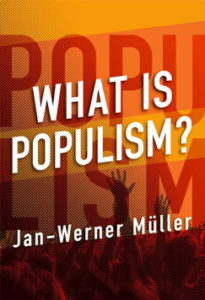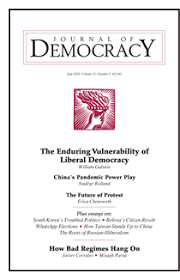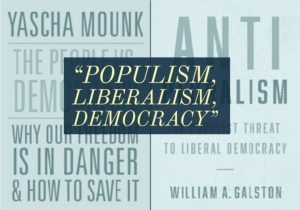 Contrary to conventional wisdom, the political business model of populists is not “giving the people what they want”. Rather, it is an exclusionary form of identity politics, where incessant talk about “unifying the people” coexists with a strategy of dividing the citizenry on the basis of a relentless culture war, argues Princeton University’s Jan-Werner Müller, author of What Is Populism?
Contrary to conventional wisdom, the political business model of populists is not “giving the people what they want”. Rather, it is an exclusionary form of identity politics, where incessant talk about “unifying the people” coexists with a strategy of dividing the citizenry on the basis of a relentless culture war, argues Princeton University’s Jan-Werner Müller, author of What Is Populism?
Liberals have spent the past decade underestimating populists. They have clung to the notion that populist policies are necessarily irrational and over-promise. They have thus assumed that populists in power would fail automatically, he writes for The FT:
They have also complacently held that, by definition, populists in government would cease to be populists because, as the new establishment, they could no longer criticise elites. They failed to realise that no populist has ever run out of scapegoats. Even if all domestic opposition is disempowered, populists can blame “shadowy international elites” for whatever may go wrong. None of this is to say that there is an unstoppable “wave” (let alone a tsunami) of populism. But smart populists actually interested in governance may still emerge more powerful from the pandemic than before.
 Populist, nationalist, and cultural-traditionalist critiques are based on misunderstandings of liberalism. Like every other form of government, liberal democracy has inherent structural weaknesses that the difficulties of the moment exacerbate but do not create. Wise leadership can mitigate these weaknesses, but it cannot eliminate them, argues Brookings analyst William A. Galston.
Populist, nationalist, and cultural-traditionalist critiques are based on misunderstandings of liberalism. Like every other form of government, liberal democracy has inherent structural weaknesses that the difficulties of the moment exacerbate but do not create. Wise leadership can mitigate these weaknesses, but it cannot eliminate them, argues Brookings analyst William A. Galston.
Populism, especially when joined with ethnonationalism, is openly tribal. It legitimates sentiments that liberal-democratic principles suppress. This is one of populism’s main sources of strength, he writes in The Enduring Vulnerability of Liberal Democracy, in the latest issue of the NED’s Journal of Democracy:
Tribes ascribe merit to their members and inferiority to nonmembers, usually in stereotypical terms. This gives rise to the remarkably stubborn phenomenon of prejudice. Even when members of a tribe are persuaded through reason and experience that their prejudice is unwarranted, the sentiment persists. Populist politicians understand this and have been known to appeal to prejudice in ways that please their followers, but which can have dangerous consequences for individual security and social order.
Populists are often associated with authoritarian and anti-democratic sentiments. If this were the case, we would expect populists to be unsupportive of democracy. However, recent research from the Netherlands finds that, in fact, populist are slightly more (not less) in favour of democracy than individuals who are less populist, according to researchers Andrej Zaslove, Bram Geurkink, Kristof Jacobs and Agnes Akkerman.

National Endowment for Democracy
Individuals with populist attitudes are slightly more in favour of democracy, less likely to protest, and more supportive of referendums and deliberative forms of political participation than those who are less populist. Is this support for people-centred forms of political representation genuine? Two conclusions are possible, they write for the LSE’s Europblog:
- Populists may intrinsically value the people-centred nature of referendums and deliberative bodies. Of course, this dovetails with the people-centred nature of populism.
- However, it is also possible that when push comes to shove, populists will eventually become frustrated with referendums and deliberative forms of participation, as has occurred with political parties.
In either case, populism is not per se a threat to democracy, but it does pose a challenge to its current manifestation, they conclude.
A new set of Democracy Talks conversations explores the powerful influence of “-isms” on democracy, the Bush Center’s Lindsay Lloyd adds. Whether it’s President Bush’s trio of nationalism, isolationism, and protectionism or Dr. Condoleezza Rice’s “four horsemen of the apocalypse” adding populism to the mix, we are seeing unprecedented challenges to democracies around the world. They affect old and established democracies like the United States and newer and more fragile systems like Hungary.







